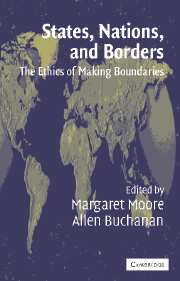Book contents
- Frontmatter
- Contents
- About the Contributors
- Acknowledgments
- 1 Introduction: The Making and Unmaking of Boundaries
- THE JEWISH TRADITION
- 2 Making and Unmaking the Boundaries of Holy Land
- 3 Man-Made Boundaries and Man-Made Holiness in the Jewish Tradition
- THE CONFUCIAN TRADITION
- THE CHRISTIAN TRADITION
- THE NATURAL LAW TRADITION
- THE ISLAMIC TRADITION
- THE LIBERAL TRADITION
- THE INTERNATIONAL LAW TRADITION
- CONCLUSION
- Index
3 - Man-Made Boundaries and Man-Made Holiness in the Jewish Tradition
Published online by Cambridge University Press: 24 November 2009
- Frontmatter
- Contents
- About the Contributors
- Acknowledgments
- 1 Introduction: The Making and Unmaking of Boundaries
- THE JEWISH TRADITION
- 2 Making and Unmaking the Boundaries of Holy Land
- 3 Man-Made Boundaries and Man-Made Holiness in the Jewish Tradition
- THE CONFUCIAN TRADITION
- THE CHRISTIAN TRADITION
- THE NATURAL LAW TRADITION
- THE ISLAMIC TRADITION
- THE LIBERAL TRADITION
- THE INTERNATIONAL LAW TRADITION
- CONCLUSION
- Index
Summary
Holiness and Boundaries
According to Menachem Lorberbaum, central to the Jewish tradition “is the conceptualization of the land in terms of its holiness.” In his view, this conceptualiztion plays a key role in determining the tradition's view on the making of boundaries. Unlike other traditions that view territory as merely “a functional substratum,” in the Jewish tradition, territory – more accurately its own territory – is viewed as “an independent good.” Thus, contends Lorberbaum, an inquiry into the connection between this Jewish, nonfunctionalist conception of the land and the attitude to the making of boundaries might enable us to make some general observations about the way nonfunctionalist conceptions of land govern reasoning about boundaries.
I am not sure, however, that this is the best conceptual framework for a discussion on the Jewish attitude to the making of boundaries. Let me start by presenting a different view on the Biblical perception of the land of Israel. According to Lorberbaum, in essence, the land is perceived as holy: “The land of Israel is the Holy Land.” Yet, surprising as this might be for some readers, in the Bible the root Q-D-SH, which denotes holiness in Hebrew, never once refers to the land of Israel! In particular, the expression “the holy land” (erets ha-qodesh) is nowhere to be found in the Bible. In the book of Isaiah (52:1), we find the term “city of holiness” referring to Jerusalem, but no reference to any land of holiness.
- Type
- Chapter
- Information
- States, Nations and BordersThe Ethics of Making Boundaries, pp. 41 - 54Publisher: Cambridge University PressPrint publication year: 2003
- 3
- Cited by

